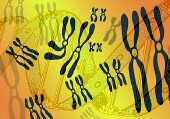CNVs linked to lower education attainment in geographically distinct unselected populations
THURSDAY, May 28, 2015 (HealthDay News) — Copy number variations (CNVs) correlate with phenotypes such as intellectual disability in the general population, according to a study published in the May 26 issue of the Journal of the American Medical Association.
Katrin Männik, Ph.D., from the University of Lausanne in Switzerland, and colleagues examined the clinical features conferred by CNVs associated with known syndromes in adult carriers. CNV analysis was conducted on a random sample of 7,877 individuals from Estonia and the authors assessed genotype-phenotype associations with education and disease traits. The results were replicated in a high-functioning group of 933 Estonians and three geographically distinct populations.
The researchers identified 56 carriers of CNVs associated with known syndromes in the Estonian cohort. Their phenotypes were similar to those described for carriers of the same rearrangements ascertained in clinical cohorts, and included cognitive and psychiatric problems, epilepsy, neuropathies, obesity, and congenital malformations. Assessment of rare autosomal CNVs identified 831 carriers of the screened general population. Overall, 5.1 percent of carriers of a deletion (≥250 kb) and 5.9 percent of carriers of a duplication (≥1 Mb) had an intellectual disability, compared with 1.7 percent in the Estonian cohort (odds ratios, 3.16 and 3.67, respectively). Rare CNVs were associated with lower educational attainment in analyses of geographically distinct cohorts.
“Known pathogenic CNVs in unselected, but assumed to be healthy, adult populations may be associated with unrecognized clinical sequelae,” the authors write.
Copyright © 2015 HealthDay. All rights reserved.








